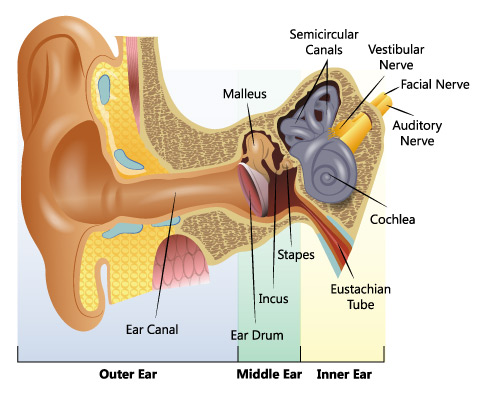Protect Your Hearing with Alpha Lipoic Acid
Most people know that loud noise can damage hearing. Deafness can also be genetic. But did you know that exposure to chemicals and certain drugs can also cause or increase the risk of permanent hearing loss? These include: (iii.109-111)
- Aminoglycoside antibiotics.
- Platinum-based chemotherapy drugs.
- Vapors from toxic chemicals.
Research also shows that exposure to toxic chemicals along with even moderate, non-toxic levels of noise can exaggerate hearing loss. Fortunately, some studies suggest that alpha lipoic acid may help protect your ears and prevent loss of hearing and deafness. (iii.12, 109)

Figure III.9: The Ear
How Can Noise and Chemicals Cause Hearing Loss?
High-intensity noise (e.g., from explosions) can physically damage the sensory cells in the ear. Chronic exposure to loud noise also generates high levels of harmful free radicals. (iii.12, 109)
Studies indicate that certain drugs and toxins cause hearing loss in a number of ways. However, they all share at least one common factor with noise: creating free radicals. Although researchers knew that free radicals were generated in the inner ear, early testing couldn't link them to specific damage causing the hearing loss. Later lab and animal studies established that free radicals damage sensory cells on the cochlea. (iii.112, 109)
How Can Alpha Lipoic Acid Help?
Animal and human studies suggest alpha lipoic acid may help prevent the damage that leads to hearing loss. In one clinical study, administration of 600 mg/day of alpha lipoic acid for 10 days prior to noise exposure protected the ear from trauma and free radical damage. (iii.12, 109)
Including generation of free radicals, toxins, antibiotics, and cancer drugs have specific biochemical activity that studies indicate can cause hearing loss. Research indicates that alpha lipoic acid can help counteract these specific effects and protect ears. (iii.109-111)
Antibiotics That Cause Hearing Loss
Aminoglycoside antibiotics are used to treat serious infections (such as pneumonia and sepsis). However, they can also cause the death of cochlear cells in ears, and may lead to temporary and permanent hearing loss. Aminoglycoside drugs include: (iii.38, 109, 113)
|
|
How Do Aminoglycosides Cause Hearing Loss? |
|---|
|
Signal Blocking. Calcium molecules bind to receptors on the sensory cells in the cochlea, which triggers the cells to release a neurotransmitter chemical. This is a necessary step to send signals through the nerve to the brain, which then translates them into sound. (iii.112) Aminoglycosides bind to receptors that calcium binds to, blocking calcium from attaching to them. Signals don't make it to the brain, resulting in temporary hearing loss. (iii.112) Free Radical Damage & Inflammation. When the ear's cells absorb the aminoglycosides, they bind to metals (e.g., copper and iron) and lipids. The compounds generate harmful free radicals and inflammatory enzymes that can damage and kill hair cells in the ear. Outer hair cells (which process high frequency sounds) are more vulnerable than inner hair cells. (iii.38, 111, 113) Increased Hearing Loss Combined with Noise. Research indicates that taking aminoglycosides during or after noise exposure increases the negative effects of hearing loss. For example, moderate, non-toxic noise levels from medical equipment before or while having antibiotic treatment causes higher rates of hearing loss in hospitalized infants than those just treated with aminoglycosides. (iii.109) |
|
How Can Alpha Lipoic Acid Help? |
|
↓ Free radicals and inflammatory enzymes. (iii.38) Alpha lipoic acid's antioxidant power can prevent toxic effects to the membrane of the ear. In an animal study, alpha lipoic acid significantly blocked harmful effects on cochlear cells and helped protect against hearing loss induced by kanamycin. The same types of enzymes are stimulated by gentamycin and amikacin antibiotics. (iii.38, 113) |
Toxic Chemicals That Cause Hearing Loss
|
Inhaling vapors from organic solvents greatly increases risks of hearing loss from noise. These compounds include: (iii.109)
|
|
Evidence of Combined Effects of Noise & Solvents on Hearing |
|---|
|
Studies show that animals exposed to jet fuel have little to no cell damage in the ears. However, exposure to jet fuel vapors and loud noises (either simultaneously or noise exposure after inhalation) caused temporary and permanent damage. This occurred even with lower levels of noise, and the effects were more severe than noise alone. (iii.109) These studies suggest that military and airport personnel who work with or fly jet planes are at a much higher risk for hearing loss than workers who are simply exposed to chemical solvents. Moreover, these conditions can be common in a variety of work places, including: (iii.109)
|
|
How Can Alpha Lipoic Acid Help? |
|
A clinical study has not been performed measuring the benefits of alpha lipoic acid against the combined effects of solvents and noise. (iii.12) However, a small randomized, controlled clinical study showed that taking daily 600 mg alpha lipoic acid supplements for 10 days protected against noise-induced hearing loss. (iii.12) 
|
Chemotherapy Drugs That Cause Hearing Loss
Platinum-based chemotherapy drugs such as cisplatin, oxaliplatin, and carboplatin are considered some of the most potent antitumor agents. They are used in a variety of cancers, including: (iii.110)
|
|
How Do Chemo Drugs Cause Hearing Loss? |
|---|
|
As the oldest platinum chemo drug, cisplatin also carries the highest risk of hearing loss (50-60% incident rate with cumulative doses over 400 mg). (iii.110) Studies reveal these drugs show the following ototoxic activity: (iii.110)
Additionally, undergoing cisplatin treatment during or after noise exposure increases its negative effects on hearing. (iii.109) |
|
Alpha Lipoic Acid Effects |
It should be noted that in 2 placebo-controlled clinical trials completed in 2013-2014, a substantial percentage of cancer patients dropped out or did not comply with dosage requirements. This occurred in both the group taking alpha lipoic acid supplements and those taking placebo supplements. (iii.116-117) Only 1 of the 2 clinical trials has published its findings. There was no statistically significant difference in neurotoxicity rates in the 29% of patients who completed the study. Based on this, and the large number of patients who failed to comply or dropped out, researchers concluded that oral supplements of alpha lipoic acid are ineffective in preventing nerve damage from cisplatin or oxaliplatin. Intravenous alpha lipoic acid, as administered in European countries, may be more feasible and effective. (iii.19, 116-117) 
|


